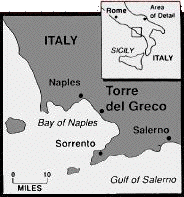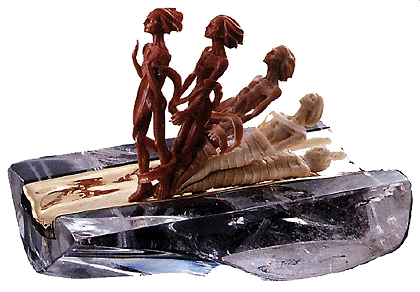|
|
Untreated Jyotish Vedic Red coral | Torre
Del Greco, Italy | The Coral's
Capital
The origin of coral has been lost in the
mists of legends for centuries: Ovid in his “Metamorphosis” and Pliny the older
in his “Historia Naturalis” both
attributed coral the same mythical genesis; the blood from Medusa’s terrible
head, cut off by Perseus, dripped into the sea and turned into coral. With its
warm and bright color, its marine origins, its ambiguous nature, coral must have
had a profound effect on the early Mediterranean peoples who started working and
used it throughout the world.
It is not a plant, even though it has branches, and as André Peyssonnel, a
doctor from Marseilles, discovered only early in the 18th century, it is not
even a mineral, even though it is petrified. It is in fact the calcareous
secretion of a marine polyp
colony.
Some archaeological sites in Sicily, Sardinia and Syria where ornaments in coral
have been found, would lead us to believe that coral was already known thousands
of years ago, but it is evident that the ancient Greeks valued it either as a
jewel or as a medicine. Alexander the Great’s ambitious plan to unify East and
West as one large empire, not only through military campaigns, but also through
cultural exchanges enhanced by heavy commerce, melted together peoples of
different cultures and customs and thereby helped the diffusion of coral as far
a field as India. Pliny gives precise evidence of this spread in his “ Naturalis
historia” saying : “Indians value coral as much as Romans value Indian pearls,
the cost varying according to the importance given by each population”.
Torre Del Greco is a sunny,
small town in the Naples Bay, at the foothills of Mount Vesuvius. It is famous
worldwide for becoming throughout the centuries, the
capital of the red coral.
This activity was almost imposed on the inhabitants by the constant menace of
 the volcano
which, over the centuries, forced the people of the coast to look to the sea for a
dependable source of income. It was the Bourbons who originally stimulated the
development of a coral industry at the turn of the eighteen century, with the first
factory being established in 1805. By 1837 there were eight factories, then, around 1850,
an authentic explosion took place in this industry producing luxury objects to sell to
rich European customers. the volcano
which, over the centuries, forced the people of the coast to look to the sea for a
dependable source of income. It was the Bourbons who originally stimulated the
development of a coral industry at the turn of the eighteen century, with the first
factory being established in 1805. By 1837 there were eight factories, then, around 1850,
an authentic explosion took place in this industry producing luxury objects to sell to
rich European customers. 
Nowadays,
Torre Del Greco is for
coral, what Bangkok is for colored stones or Antwerp and Mumbay for diamonds:
The worldwide center for
coral production.
With the depletion of the Mediterranean coral
banks in the current century, Torre Del Greco
also imports corals from Japan, Taiwan,
Korea, Spain, Morocco, and the Pacific to meet the national and international demand. This rough
will be then transformed in single cabochon pieces for
jewelry, strands
necklaces and magnificent carvings.
In Torre Del Greco, working coral is a family business. There are no big
size manufacturers, but instead many small family-based enterprises, where
employees are often members of the family and their relatives.
Getting
untreated and undyed
material is becoming an arduous task. Like with sapphires, it is
estimated that less than 5% or so of all the coral present in
the market today, is completely untreated.
The rarest and most prized of all
the coral is that of the Sciacca coral bank, a beautiful
pink-orange variety of vulcanic origin from off the coast of West Sicily that is today completely extinct. The
little of it that is remaining available today on the market is the Torrese
and Sicilian production of
a century ago. It commands huge prices among connoisseurs.
Then, the ox-blood variety, a deep
red color,
which is becoming very rare as well. Today, this beautiful coral demands very
high prices in any quality found.
Common red coral is
averagely orangey in color and it is the standard
quality found anywhere. It is not very expensive in small
sizes, but increasingly hard-to-get in bigger sizes.
However coral can hue from snow white to black, to blue and shades
of pink & red and any muted
colors in between.

Back to the
Red
Corals Showcase
|